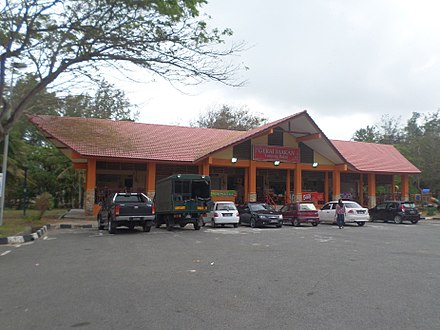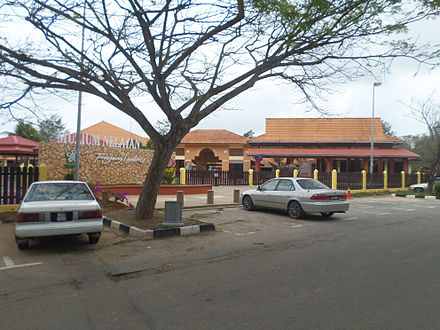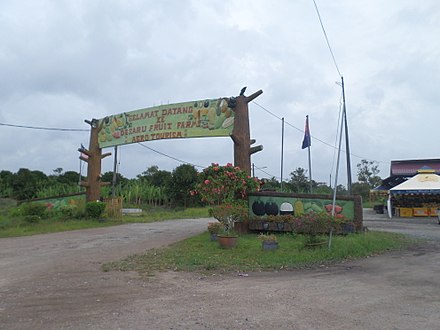
Desaru is a coastal town in Kota Tinggi District, Johor, Malaysia. The town houses the integrated beach resorts with water theme parks, golf courses, hotels and villas facing the South China Sea. It is also known as the Land of Casuarinas because of the casuarina trees along the beaches. The small town of Bandar Penawar, about 2 km inland, serves as the area's transport hub.
Understand
The Desaru Coast stretches along the 22 km of beach. By admittedly high Malaysian standards, the greyish beach with often murky water is nothing special, but it's the closest beach to Johor Bahru and that's what originally kicked off tourism here.
Since the 2010s, major investments have been made in the area's once dire hotels with an eye to attracting visitors from nearby Singapore and further abroad, with mixed success.
Climate
Like all of Malaysia's east coast, Desaru is highly seasonal, with monsoon winds and rains lashing the coast between November and February. There is still plenty of sunshine even during the rainy season, but waves are high and it rains more. The "good" season is thus from April to October, with June to August being the busiest months, when the waters are inviting and the sand fine.
Get in
By plane
The town does not have its own airport. The nearest airport is the Senai International Airport (IATA: JHB) in Senai, 70 minutes away, which has flights to most Malaysian cities and a few regional destinations.
Singapore's far larger Changi (IATA: SIN) is not far as the bird flies, but unless you can time a connection with the ferry (see below), the complicated logistics of cross-border transport mean that you should budget at least 3 hours for the trip.
By boat
Batamfast operates one daily return ferry from Singapore's Tanah Merah Ferry Terminal to Desaru Coast Ferry Terminal. Travel time is around 90 minutes and tickets are S$70/118 one-way/return. Previous ferry services from Singapore to Tanjung Belungkor no longer operate.
Pre-COVID, an alternative was to take a bumboat from Changi Point Ferry Terminal in Singapore to Pengerang (Tg Pengelih) for S$10 per person, and then hire a taxi from the Pengerang terminal to Desaru. This should cost around RM40 one-way. The schedule is flexible - boats leave whenever they have 12 passengers - but be prepared to queue for a couple of hours at weekends. These services, too, have been suspended for time being.
By bus
- Penawar Bus and Taxi Terminal (Terminal Bas dan Teksi Penawar), 1.554710°, 104.228593°. There are direct Mara Liner coach services four times a day from Johor Bahru's Larkin Bus Terminal to Bandar Penawar via Kota Tinggi at 10:30AM, 1PM, 5PM and 8PM. The one-way fare is RM8.20. From Bandar Penawar, you can either take a cab (teksi) for about RM10, or wait the minibus that will take you directly to Desaru Resort (the minibus is RM1, comes every 30 min). 2019-11-29
Alternatively, you can take a non-express bus from Larkin Bus Terminal (Maju 227 or Causeway Link 66) or JB Sentral Terminal (Transit Link 41, Maju 227, Causeway Link 6B) to Kota Tinggi's bus terminal (duration about 1 hr; Maju 227 one-way fare from City Square RM4.80; average frequency of Maju 227 is 15 min), and then take another bus from Kota Tinggi to Bandar Penawar (duration max. 1 hr, one-way fare RM4.50, frequency every 90 min). You can also take a cab from Kota Tinggi directly to Desaru Resort, this will cost you approximately RM35.
By car
Take the Senai-Desaru Expressway and its bridge across the Johor River from Johor Bahru to Desaru which takes around 30 minutes. From Kuala Lumpur, take the PLUS Expressways southbound and exit at Senai Utara. From there take the E22 expressway until the eastern end, which terminates at Taman Desaru Utama.
Get around
There is no public transport in Desaru. If you find yourself stuck with no bus to take you to Bandar Penawar, try asking the staff at the restaurant to call you a taxi. They know a lot of taxi drivers and most likely will love to help both you and their driver friend. The price should be around 15 RM to Bandar Penawar or 40 RM to Kota Tinggi. Alternatively, you can try your luck on the Grab app.
By car
- KLezcar Bandar Penawar Car Rental, No. 101, Jalan Kempas 1, Taman Desaru Utama, Bandar Penawar 81930, 1.573835°, 104.205340°, +60193780555. Tu-Sa 8AM-10PM, Su M 9AM-10PM. Car rental. 2019-11-29
See
Museums
- Tanjung Balau Fishermen Museum (Muzium Nelayan Tanjung Balau), Tanjung Balau, 1.614856°, 104.257873°. Museum. 2018-08-09
Nature
- Bandar Penawar Arca Park (Taman Arca Bandar Penawar), Bandar Penawar, 81930, 1.554138°, 104.227806°. Public park. 2019-11-29
- Bandar Penawar Public Field (Padang Awam Bandar Penawar), Bandar Penawar, 81930, 1.553894°, 104.231121°. Green field. 2019-11-29
- Desaru Beach (Pantai Desaru), Jalan Desaru, 1.54606°, 104.263335°. Beach. 2022-02-07
- Desaru Fruit Farm, Sungai Cemaran Desaru, 1.583972°, 104.1935°, +60 7-822 5886. 100 cultivars of fruit and a mini zoo. 2022-02-07
- Koref Desaru Leisure Farm, 1.717971°, 104.181473°, +60 127898158, +60 127208158, koref.tamps@gmail.com. An eco resort with outdoor water challenge, tree house & vegetable garden. 2019-11-29
- Penawar Lake Park (Taman Tasik Penawar), Bandar Penawar, 81930, 1.556051°, 104.228607°. Lake park. 2019-11-29
- Tanjung Balau Beach (Pantai Tanjung Balau), Tanjung Balau, 1.615570°, 104.257733°. Beach 2019-11-29
Do
Desaru is a semi-developed resort area and there are a lot of things to do while you are there. Take advantage of the nice wide beach, and of the shallow and clear water. All 22 km of it is open to all, even the stretches in front of the hotels, but most locals congregate at the public beach, which provides a carpark, a few barbeque pits and grotty toilets.
Snorkeling is a good option, but don't expect banks of colorful fishes and wonderful sea creatures. Scuba diving here is out of the question, although some of the resorts do arrange trips out to Johor's northern islands.
One thing you can definitely try is surfing. If wind is good, the waves are quite OK, and especially the lack of jellyfish and sharks makes it an attractive location. During December, January and first half of February (monsoon season), the waves are almost constantly high, but do expect the water to be a little cold. There is a company that rents surf boards for RM 20/hour and provides surf lessons for RM 100. The same company rents jetskis.
Excursions to see the fireflies (api-api) in the Sungei Lebam river are very popular. While it's possible to arrange yourself, this would require bumping about dirt roads to find the dock and then cruising around a pitch-black jungle river, so it's much easier to join one of the hotel excursions. The best time to go is after rain on a new moon.
Theme parks
- Desaru Coast Adventure Waterpark, Persiaran Damai, Desaru Coast, 1.539893°, 104.26191°, +60322039696, info@dcawp.com. Th-Su 10AM-6PM. Water theme park with 5 play zones. 2022-02-07
Sports
- Bandar Penawar Skate Park, Bandar Penawar, 81930, 1.557165°, 104.228454°. Skate park. 2019-11-29
- Penawar Stadium (Stadium Penawar), Bandar Penawar, 81930, 1.555268°, 104.223592°. Football stadium. 2019-11-29
- The Els Club Desaru Coast - Ocean Course, No. 4, Jalan Danau, Desaru Coast, 81930, 1.527249°, 104.267151°. 27-golf course. 2019-11-29
- The Els Club Desaru Coast - Valley Course, No. 2, Jalan Pantai 2, Desaru Coast, 81930, 1.550533°, 104.256094°. 18-hole golf course which spans over 41 hectares. 2019-11-29
Learn
The ELS Performance Golf Academy.
Buy
- SKS City Mall, Taman Desaru Utama, Bandar Penawar, 1.574509°, 104.206898°, +60 127522057. Shopping mall. 2019-11-29
Eat

If you have your own wheels or join one of the hotel-arranged "excursions", the fishing village of Sungai Rengit, some 30 km away, has a few seafood restaurants. (Oddly, the much closer Tanjung Balau does not have any.) There are also a few basic restaurants in Bandar Penawar.
Food courts
- Penawar Food Court (Medan Selera Penawar), Jalan Dato Haji Hassan Yunus, Bandar Penawar, 81930, 1.557027°, 104.231381°. Food court. 2019-11-29
- Tanjung Balau Food Court (Medan Selera Tanjung Balau), Kampung Nelayan Tanjung Balau, Benut 81930, 1.610940°, 104.259214°. Food court. 2019-11-29
Resort restaurants
Many of the nice signature restaurants are in the resorts, although non-guests are always welcomed to the eateries.
- Lotus Seafood Restaurant, Lotus Desaru Beach Resort and Spa, 1.564618°, 104.253491°. Seafood restaurant. 2019-11-29
- Nakon Thai Boat Noodle Hot Pot BBQ, Tunamaya Beach and Spa Resort - Desaru Coast, 1.556015°, 104.255060°. Thai restaurant. 2019-11-29
- Nelayan Seafood By The Coast, Tunamaya Beach and Spa Resort - Desaru Coast, 1.558958°, 104.255036°. Seafood restaurant. 2019-11-29
- Prego, The Westin Desaru Coast Resort, 1.541970°, 104.263361°. Italian Restaurant. 2019-11-29
- Shiokaze Teppan, Sand and Sandals Desaru Resort and Spa, 1.561260°, 104.253184°. Japanese restaurant. 2019-11-29
Drink
- 261 Bar & Restaurant, The Els Club Desaru Coast - Ocean Course, 1.527200°, 104.267107°, +6078780002. 6:30AM-10:00PM. Bar. 2019-11-29
- Beach Bar, The Westin Desaru Coast Resort, 1.541798°, 104.264493°. Bar. 2019-11-29
- Sunken Bar, Sand and Sandals Desaru Resort and Spa, 1.561144°, 104.254259°. 11AM-11:59PM. Bar. 2019-11-29
Sleep
accommodation in Desaru caters to various segments of tourists, from the traditional and classic style accommodation to the modern. Most of the accommodation is generally divided into two areas, the Bandar Penawar town areas and the beach front resort area in Desaru.
Budget
- Desaru Holiday Chalets, 1.508557°, 104.277314°, +60 7-8221212. Opened in 1974, this is Desaru's oldest place to stay. Simple little beachfront chalets with aircon, fridge. "Standard" chalets have no hot water, while "Superior" ones do. The "Single" chalets house 2, while the "Doubles" are intended for four. From RM120
- K2 Hotel Desaru, No. 7-1, Jalan Jelutong 1, Taman Desaru Utama, Bandar Penawar 81930, 1.573277°, 104.211825°, +6078861224. 2019-11-29
Mid-range
- Yolo Desaru, No. 2A, Jalan Dahlia 3, Taman Sri Penawar, 81930 Bandar Penawar, 1.591902°, 104.228183°, +60137718963, yolodesaru@gmail.com. Hotel. 2019-11-29
- Desaru Villa Resort At Arcadia (Arcadia Resort At Desaru), Arcadia Resort At Desaru (By Bus , By Car , By Ferry), 1.574519°, 104.211403°, +60 169693242. Check-in: 3, check-out: 12. Rm400 2023-02-18
Splurge
-
Amansari Hotel Desaru (Hotel Amansari Desaru), No. 127, Jalan Kempas 1, Taman Desaru Utama, Bandar Penawar 81930, 1.573071°, 104.205993°, +6078280200, info.hd@amansarihotels.com. Check-in: 3PM, check-out: noon. Hotel. 2019-11-29
-
Hard Rock Hotel Desaru Coast, Jalan Pantai 3, Desaru Coast, 81930 Bandar Penawar, 1.540191°, 104.263716°, +6078388888, info@hrhdesaru.com. Hotel. 2019-11-29
Resorts
- Anantara Desaru Coast Resort and Villas, No. 1, Persiaran Damai, Desaru Coast, 1.538792°, 104.268217°, +60 7 828 0888, desaru@anantara.com. Offers a range of rooms, villas and residences with Malaysian, Thai and international dining and various family activities. 2019-11-29
- Bayu Balau Beach Resort, Kampung Nelayan Tanjung Balau, 81930 Bandar Penawar, 1.612336°, 104.258985°, +60137231330. Resort. 2019-11-29
- Lotus Desaru Beach Resort and Spa, Lot 1854, Jalan Desaru, Bandar Penawar 81930, 1.564162°, 104.251421°, +6078842800. Resort. 2019-11-29
- Sand and Sandals Desaru Resort and Spa, Bandar Penawar, 81930, 1.561240°, 104.253178°, +6078222222, enquiry@sandandsandals.com. Resort. 2019-11-29
- Tiara Resort, 213, Bandar Penawar 82200, 1.585185°, 104.255380°, +60127830522. Resort 2019-11-29
- Tunamaya Beach and Spa Resort - Desaru Coast, Bandar Penawar, 81930, 1.557473°, 104.255437°, +6078338888, info.dtbsr@careluxuryhotels.com. Resort. 2019-11-29
- The Westin Desaru Coast Resort, Jalan Pantai 3, Desaru Coast, 81930 Bandar Penawar, 1.541333°, 104.264637°. Hotel 2020-12-08
Respect
Desaru is a beach popular mostly with the locals. As such, especially if you go outside the resorts, you will see a lot of Malays bathing with long pants and t-shirts, a good way to both fend off the sun and to maintain modesty. For visitors, toplessness is not appropriate, but a normal bikini for girls and shorts for guys is ok.
Cope

Tourist offices
- Bandar Penawar Tourist Information Centre (Pusat Penerangan Pelancongan Bandar Penawar), Bandar Penawar, 81900, 1.555188°, 104.230004°. Tourist office. 2019-11-29
Connect
- Pos Malaysia Bandar Penawar Post Office, JKR 670, Jalan Dato Haji Hassan Yunus, Bandar Penawar, 81900, 1.555282°, 104.230963°. 2019-11-29
Go next
- Kota Tinggi — visit the famous Kota Tinggi waterfall, the local Kota Tinggi museum, and do some simple Malaysian shopping
- Pengerang (Sungai Rengit) — seafood restaurants at the southeastern tip of Johor
- Johor Bahru and Pasir Gudang
- Singapore — an hour and a world away


